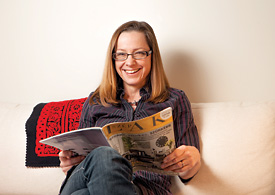
Photo by Austin Thomason, Michigan Photography.
The decision to study Hungary was easy for Krisztina Fehervary, assistant professor of anthropology, LSA.
It was her father, Istvan, who helped connect Fehervary to her Hungarian roots. Istvan Fehervary had spent eight years in a communist prison for writing down the numbers of Soviet tanks during the Hungarian transition to communism in the 1940s. “My dad considered himself a Hungarian patriot, and he interpreted his time in prison as being a soldier for the nation by fighting communism,” Fehervary says.
Born in Austria, Fehervary spoke German until she was 4. Then her family moved to Morocco, where she began speaking Spanish, English and a little Arabic. After three years in Morocco, her father — who met Fehervary’s American mother in 1956 during the influx of Hungarian intellectuals in Vienna — decided to settle their family in Santa Fe, N.M.
Fehervary’s mother took her to Hungary for the first time in the 1970s when she was 10 years old. “Everything was so different and bizarre. It was just an upside-down world and I was fascinated with it,” says Fehervary, who often talked politics with Hungarian men who were curious if the United States was paying attention to Hungary. In the process, she gained a different perspective from her father on life under communism, seeing both the advantages of a social welfare state as well as the oppressiveness of a one-party dictatorship.
What moment in the classroom stands out as the most memorable?
When students get insights into their everyday practices by thinking anthropologically, when they realize: “Wow, I never thought about it like that before.”
What can’t you live without?
My family.
What is your favorite spot on campus?
I love to work in the old Law Library reading room.
What inspires you?
My students and colleagues.
What are you currently reading?
Lots of things, but I’m looking forward to reading Daniel Boorstin’s “The Americans” this summer.
Who had the greatest influence on your career path?
Many wonderful people, but the late anthropologist Edward T. Hall most of all.
After graduating from Brown University and working various jobs in Washington, D.C., Fehervary decided to attend graduate school at the University of Chicago, focusing on anthropology and Eastern Europe. “I went to Hungary to do my fieldwork in a planned socialist town called Dunaujvaros, where I studied middle-class life,” Fehervary says.
In an attempt to meet new people in the town, Fehervary, began playing recreational soccer. “I joined a woman’s soccer team with girls who were hoping to use the game to get them out to the west, to join a professional team in Germany,” Fehervary says.
After completing her degree, Fehervary became a professor at U-M, teaching anthropology and continuing her studies of Hungary, as well as Eastern Europe as a whole. Her next project focuses on teeth and smiling.
“I want to explore how communism built on longer-term notions that regarded commerce with suspicion, and how a salesmanship smile became equated with servitude and debasing yourself,” says Fehervary, who is contemplating taking classes at the School of Dentistry to help her in her latest project. “Hungary is now the number one destination for dental tourism in Europe, and so I am interested in seeing if attitudes towards the ‘selling smile’ are changing.”
The weekly Spotlight features faculty and staff members at the university. To nominate a candidate, please contact the Record staff at [email protected].

